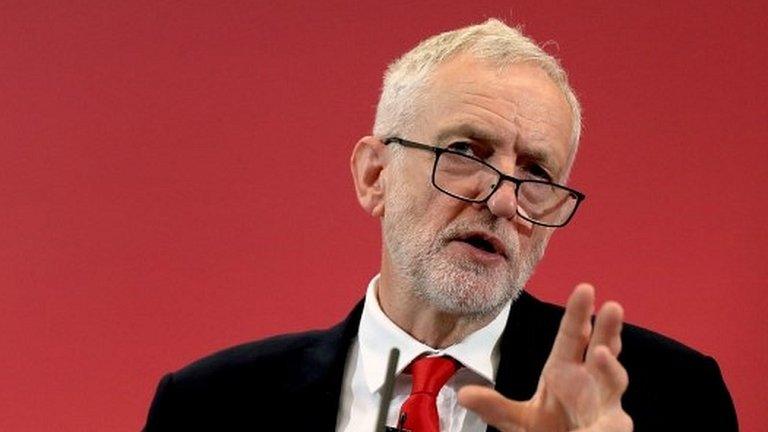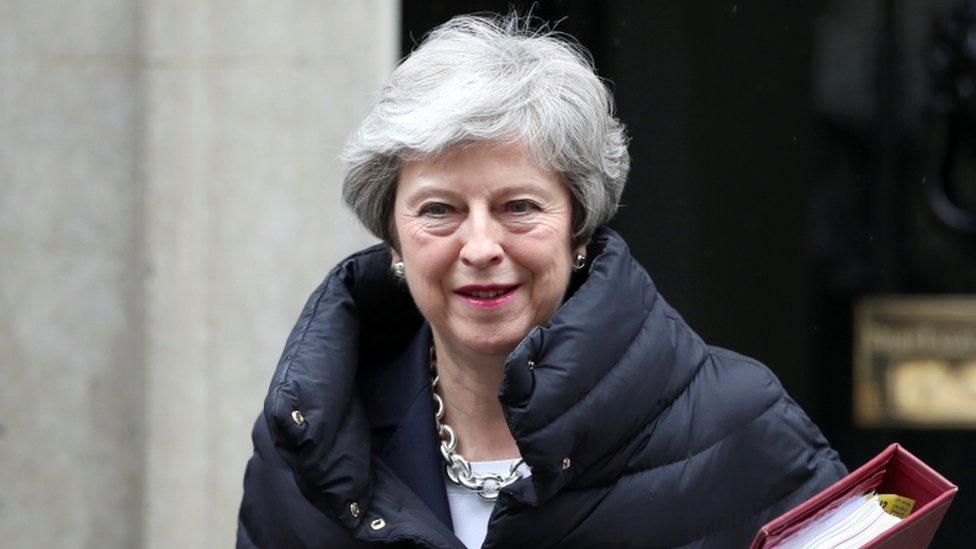Can Jeremy Corbyn heal the Brexit divide?
- Published

Jeremy Corbyn wants to ditch the labels of Leave and Remain, to stop worrying about the "48" and the "52" and to concentrate on the country as a whole.
He says only Labour can bring the two warring sides together. In other words - time to move on.
The idea of turning the page will be tantalising to millions, but peeling those labels off our politics is, for now at least, probably wishful thinking.
In his own party, the most fevered question is over whether to allow, even help Brexit on its way, or to have another referendum to try to stop it - that's an issue of Leave or Remain.
Just after he gave his speech in Kent, launching Labour's European election campaign, two party activists expressed the difference precisely.
One of them told us they were "disappointed with the party's half-and-half" approach to Brexit, and keen for another referendum to stay in.
Moments before, a different party member told me: "Us Remainers lost. We have to get out of Europe," and was really worried that holding out the possibility of another referendum was hurting Labour on the doorstep.
Second, the central argument in Parliament has been for many, many, months, whether to back the deal that takes us out even if it's flawed, or to continue to reject it - again that's an issue of stay or go.
At some point, probably not next week, that question will be front and centre again, the noisy cases on both sides being made in Westminster, where the two labels fundamentally ARE the argument.
And the arrival of the Brexit Party and Change UK mean too that, for the next couple of weeks at least during the European elections, the clash between Leave and Remain will be deafening.
More importantly than any of that, of course, is where the public is.
And since 2016 it has been the case that, when you talk to voters in different parts of the country, so often they identify themselves as Leavers or Remainers.
And there is academic evidence, external to suggest that those labels might be stronger now for some voters than attachment to any political party.

Do the possible candidates to replace Theresa Maythink they can get Brexit "done"?
Plenty of politicians and maybe many members of the public might wish we could turn the clock back, or somehow leap forward to a time when those labels don't really mean much.
But until there is some kind of resolution to Brexit, it's hard to see that happening.
And there is a new and genuinely different divide opening up that defies party lines too - not a clash between those who backed Brexit, and those who want to remain in the EU but between politicians who think the last three years have changed things for good and those who believe sooner, or probably later, the process will be sort of complete and politics can return to something that's a bit more conventional. A dispute which is not between Leave or Remain, but maybe between "returners" and "revolutionaries".
It is not about what side you took on the European issue itself, but about whether you accept or reject the notion that it has changed politics for good.
A sub-plot of the pretty brazen Tory leadership contest that's going on while Theresa May ploughs on is whether the tentative candidates think they can get Brexit "done", then pursue a rather familiar Tory trajectory, or whether Brexit is a starting point for a bigger, more lasting change to the political landscape.
Don't worry if you don't like that pair of labels. In Westminster, another set will be along sooner or later.
But the Leaver or Remainer tags are stuck for now, for good reason. As so often with Brexit, despite his sincere objections to the Tory approach, you can't help feeling that Mr Corbyn just wishes it was all over.
Given the levels of frustration around, that may well find some public sympathy.
But telling us that the labels ought to be a thing of the past, is not the same as making that true.